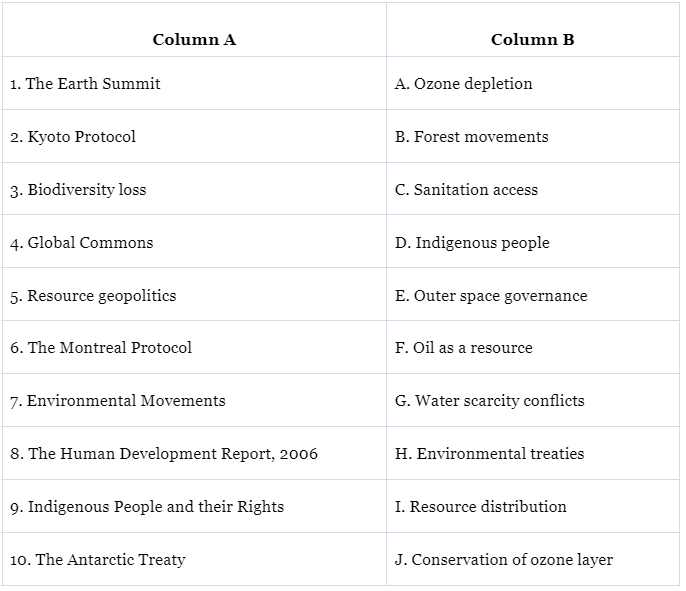Worksheet: Environment & Natural Resources | Political Science Class 12 - Humanities/Arts PDF Download
| Table of contents |

|
| Fill in the Blanks |

|
| Match the Column |

|
| Assertion and Reason Based |

|
| Very Short Answer Type Questions |

|
| Short Answer Type Questions |

|
| Long Answer Type Questions |

|
Fill in the Blanks
Q1: The Human Development Report, 2006 estimates that ______ billion people lack access to sanitation.
Q2: Biodiversity loss is primarily caused by _______.
Q3: The Earth Summit in 1992 took place in _______.
Q4: The global resources shared by the international community are known as ________.
Q5: The Kyoto Protocol set targets for ________ nations to reduce greenhouse gas emissions.
Q6: ________ played a significant role in environmental movements.
Q7: Resource geopolitics refers to who gets what, when, where, and how in the context of ________.
Q8: West Asia, particularly the Gulf region, accounts for about ______% of global oil production.
Q9: Water scarcity has been a major cause of conflicts in the ______ century.
Q10: Indigenous populations are defined by the United Nations as the ancestors of people who lived in a territory when ________ first arrived.
Match the Column
Q1:

Assertion and Reason Based
Q1: Assertion (A): Biodiversity loss is primarily due to deforestation.
Reason (R): Deforestation leads to the removal of natural habitats.
(a) Both A and R are true, and R is the correct explanation of A.
(b) Both A and R are true, but R is not the correct explanation of A.
(c) A is true, but R is false.
(d) A is false, but R is true.
Q2: Assertion (A): The Kyoto Protocol set targets for all nations to reduce greenhouse gas emissions.
Reason (R): Developing countries like India and China were exempted from the Kyoto Protocol requirements.
(a) Both A and R are true, and R is the correct explanation of A.
(b) Both A and R are true, but R is not the correct explanation of A.
(c) A is true, but R is false.
(d) A is false, but R is true.
Q3: Assertion (A): Resource geopolitics pertains to the allocation of resources during the Cold War.
Reason (R): Oil is considered the most important resource in global politics.
(a) Both A and R are true, and R is the correct explanation of A.
(b) Both A and R are true, but R is not the correct explanation of A.
(c) A is true, but R is false.
(d) A is false, but R is true.
Q4: Assertion (A): Indigenous people advocate for the recognition of their continued existence as independent communities.
Reason (R): Indigenous populations are primarily found in North America.
(a) Both A and R are true, and R is the correct explanation of A.
(b) Both A and R are true, but R is not the correct explanation of A.
(c) A is true, but R is false.
(d) A is false, but R is true.
Very Short Answer Type Questions
Q1: What did the Earth Summit in 1992 result in?
Q2: List two agreements related to the Antarctic.
Q3: Explain the concept of Global Commons.
Q4: Why were developing countries like India and China exempted from the Kyoto Protocol requirements?
Q5: What are some of the significant remedies provided by environmental movements?
Q6: What does resource geopolitics refer to?
Q7: Where is about 30% of global oil production located?
Q8: What is one of the main causes of conflicts in the 21st century, according to the text?
Q9: What percentage of India's population consists of scheduled tribes?
Q10: What regions are occupied by indigenous populations?
Short Answer Type Questions
Q1: Explain the common but differentiated responsibilities concept in international environmental law.
Q2: How did India justify its exemption from the Kyoto Protocol's restrictions in 2005?
Q3: Describe the role of volunteer organizations in addressing environmental degradation.
Q4: Discuss the significance of water as a resource in global politics and potential sources of conflict.
Q5: What are some of the major environmental issues highlighted in the text, and why are they significant in global politics?
Q6: Explain the role of the Montreal Protocol in addressing environmental concerns.
Q7: What is the main purpose of the Antarctic Treaty, and why is it important?
Q8: How do North-South disparities impact the management of global commons, particularly in the context of outer space?
Long Answer Type Questions
Q1: Discuss the challenges faced by developing nations in the context of environmental conservation and the measures proposed at international forums to address these challenges.
Q2: Examine the significance of Indigenous People's rights in the context of global politics and the challenges they face in asserting these rights.
Q3: Explain the concept of Resource Geopolitics and analyze how it influences global political strategies, especially in the context of oil and water resources.
Q4: Evaluate the role of environmental movements in shaping global environmental policies, citing specific examples from the text.
You can access the solutions to this worksheet here.
|
34 videos|308 docs|51 tests
|
FAQs on Worksheet: Environment & Natural Resources - Political Science Class 12 - Humanities/Arts
| 1. What are the major causes of deforestation? |  |
| 2. How does deforestation affect climate change? |  |
| 3. What are the consequences of deforestation on biodiversity? |  |
| 4. How does deforestation impact local communities? |  |
| 5. What are some sustainable solutions to combat deforestation? |  |















